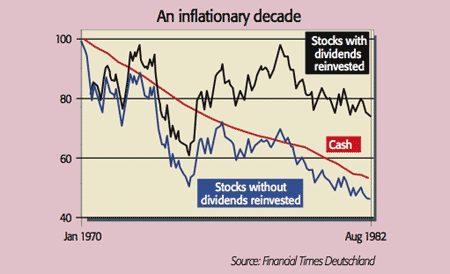Get the latest financial news, insights and expert analysis from our award-winning MoneyWeek team, to help you understand what really matters when it comes to your finances.
You are now subscribed
Your newsletter sign-up was successful
Want to add more newsletters?

Twice daily
MoneyWeek
Get the latest financial news, insights and expert analysis from our award-winning MoneyWeek team, to help you understand what really matters when it comes to your finances.

Four times a week
Look After My Bills
Sign up to our free money-saving newsletter, filled with the latest news and expert advice to help you find the best tips and deals for managing your bills. Start saving today!
Stockmarkets reacted to the Fed's latest round of quantitative easing (QE2) "in classic Pavlovian fashion", says Tim Price of PFP Wealth Management. "Ring the dinner bell announcing fresh liquidity, and they will rally in response."
Never mind poor fundamentals: after all, yet more money printing shows that the Fed thinks the economy is in lousy shape. "Euphoria sponsored by liquidity provision" propelled the S&P 500 and the FTSE 100 to their highest levels in over two years last week.
But plenty of factors threaten the QE-induced rally in the short term, as markets' setback this week has shown. Investors have had a reminder that "everything on the planet is not hunky-dory", says Alan Abelson in Barron's. Europe's debt crisis has flared up again and China's unexpectedly strong inflation points to higher interest rates and a slower economy. In America, the fiscal stimulus is going into reverse.
MoneyWeek
Subscribe to MoneyWeek today and get your first six magazine issues absolutely FREE

Sign up to Money Morning
Don't miss the latest investment and personal finances news, market analysis, plus money-saving tips with our free twice-daily newsletter
Don't miss the latest investment and personal finances news, market analysis, plus money-saving tips with our free twice-daily newsletter
In the medium term, the chief threat for investors following all this money-printing is a jump in inflation, says FT Deutschland. That's bad news for stocks, as the 1970s showed. Between 1970 and 1982 the German market was down by 26% in inflation-adjusted terms even after reinvesting dividends (see chart). Without dividends, stocks did worse than cash. Barclays Capital also notes that since 1929 US stocks have produced an annual average total real return of 0.34% during periods of high inflation (over 4%).

There are two reasons inflation hits stockmarkets, says FT Deutschland. "As a rule" inflation becomes more volatile the higher it is. That creates uncertainty and hampers confidence in the economy. The other problem is that high inflation has to be squeezed out of the system by a determined central bank. In the early 1980s, the Fed under Paul Volcker raised interest rates sharply to conquer inflation. But this is "brutal" for equities as dearer money hits both profits and valuations.
Given all this, defensive stocks remain a solid bet, especially since they are typically found in industries able to raise prices to keep pace with inflation energy and utilities, for instance. With fears of inflation, currency debasement and general uncertainty likely to be with us for some time, gold the ultimate store of value remains a solid hold.
Get the latest financial news, insights and expert analysis from our award-winning MoneyWeek team, to help you understand what really matters when it comes to your finances.
MoneyWeek is written by a team of experienced and award-winning journalists, plus expert columnists. As well as daily digital news and features, MoneyWeek also publishes a weekly magazine, covering investing and personal finance. From share tips, pensions, gold to practical investment tips - we provide a round-up to help you make money and keep it.
-
 What is a care fees annuity and how much does it cost?
What is a care fees annuity and how much does it cost?How we will be cared for in our later years – and how much we are willing to pay for it – are conversations best had as early as possible. One option to cover the cost is a care fees annuity. We look at the pros and cons.
-
 How to navigate the inheritance tax paperwork maze in nine clear steps
How to navigate the inheritance tax paperwork maze in nine clear stepsFamilies who cope best with inheritance tax (IHT) paperwork are those who plan ahead, say experts. We look at all documents you need to gather, regardless of whether you have an IHT bill to pay.

